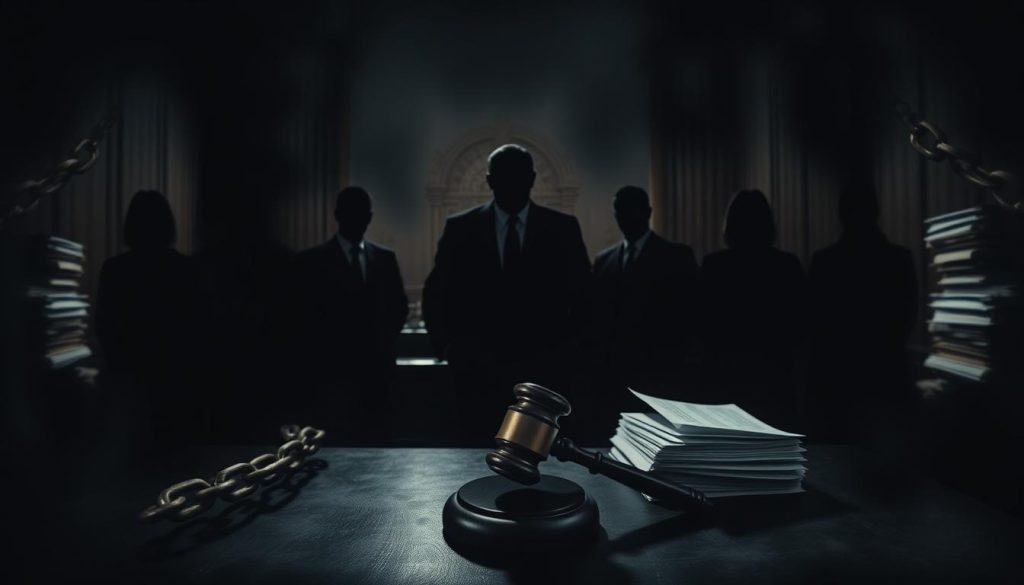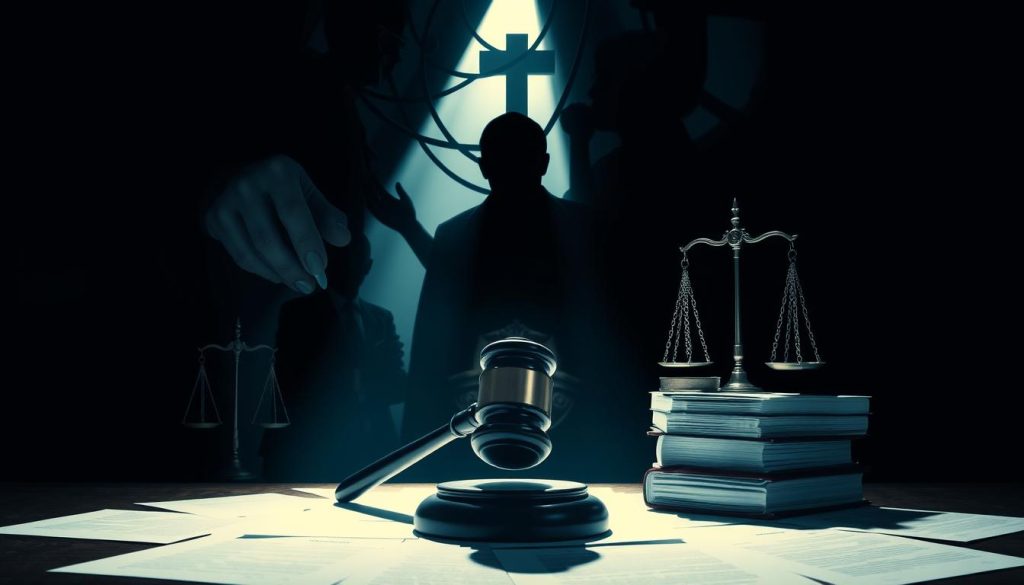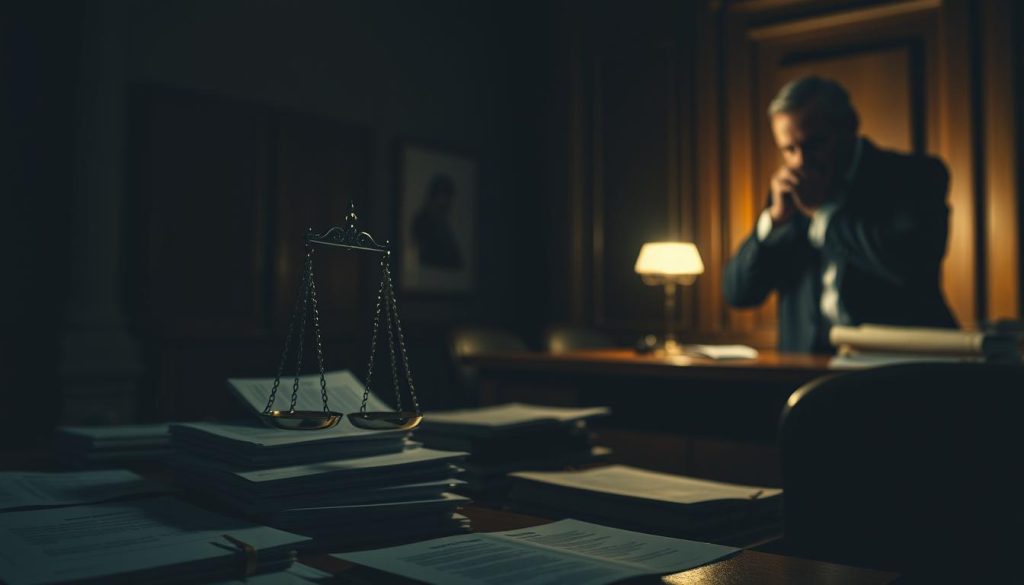Understanding criminal defense conspiracy is like walking through a minefield. Lawyers must be very careful to protect their clients’ rights. They face many challenges, from the RICO Act to charges of fraud or drug distribution.
But do lawyers really work with the justice system, or do they stand up against it? In this article, we’ll explore the complex world of criminal defense conspiracy. We’ll look at what conspiracy is, the importance of agreements, and the benefits of conspiracy laws. We’ll also discuss joining or leaving a conspiracy, the challenges of defending against these charges, and the penalties involved.
Key Takeaways
- Criminal defense lawyers play a crucial role in protecting their clients’ rights against the broad reach of federal conspiracy laws.
- Conspiracy charges can lead to severe penalties, including lengthy prison sentences and hefty fines, regardless of the level of individual involvement.
- Understanding the nuances of conspiracy law, including the definition of an “agreement” and the concept of vicarious liability, is essential for effective defense strategies.
- Navigating the challenges of conspiracy charges, such as the broad nature of the charge and the use of co-conspirator statements, requires skilled legal representation.
- Ongoing discussions and reforms within the legal community aim to ensure conspiracy laws align with the principles of justice and uphold individual rights.
- https://finserviceshub.com/credit-risk-governance-navigating-the-complexities-of-modern-finance/
What is a Criminal Conspiracy?
A criminal conspiracy is when two or more people agree to break the law and then do something to make it happen. The main parts of a criminal conspiracy are: an agreement between two or more people, a plan to break federal law or cheat the United States, and doing something to make the plan happen.
Definition and Elements of Conspiracy
Conspiracy is a crime that needs specific intent. This means the government must show that the people really meant to agree. The five main parts of a criminal conspiracy are:
- Two or more people
- An intentional agreement
- To break federal law or cheat the United States
- The doing of something to make it happen
- In furtherance of the agreement
In some places, you need to do at least one thing to be considered guilty of conspiracy. There’s no limit to how many people can be in a conspiracy. If someone changes their mind, it doesn’t change their guilt.
“Conspiracy is an inchoate offense, meaning the agreement itself is the essence of the crime.”
The Agreement: Essence of Conspiracy
In criminal defense conspiracy, the agreement is key. It’s important to know that conspiracy is a separate crime from the main offense. To prove conspiracy, the government must show an agreement between two or more people to commit a crime.
The agreement doesn’t have to be written or clear. It can be shown through actions and the situation around them. But, the government must also prove an act was done to make the agreement real. This act doesn’t have to be illegal, but it shows the agreement is moving forward.
- The agreement is the essence of any criminal conspiracy.
- Conspiracy is a distinct and separate crime from the underlying substantive offense.
- The government must prove the existence of an agreement and an overt act in furtherance of the conspiracy.
- The overt act does not need to be illegal, but it must demonstrate the conspiracy has moved from talk to action.
Knowing about the agreement is vital when facing conspiracy charges. Skilled criminal defense lawyers can question the prosecution’s evidence. They can say the agreement or act is not enough to prove conspiracy.
“Conspiracy is an independent offense, separate from the offense the conspirators seek to carry out.”
Statistics show conspiracy charges are common in white-collar crimes. This lets prosecutors hold everyone accountable for the crimes. But, the defense can also argue that the evidence doesn’t meet the legal standards for a conspiracy conviction.
Advantages of the Conspiracy Statute
The conspiracy statute has many benefits for law enforcement and prosecutors. It makes all members of a conspiracy liable for each other’s actions. This is because of the vicarious liability rule. Also, statements made by co-conspirators can be used as evidence against others, even if they are not hearsay.
Vicarious Liability and Co-Conspirator Statements
The statute lets prosecutors hold people accountable for their co-conspirators’ actions. This means each person in the conspiracy can be charged for the crimes done by others. It’s based on the vicarious liability principle.
Also, statements made by co-conspirators can be used as evidence. These co-conspirator statements are allowed as evidence. They help prove the conspiracy and the accused’s involvement.
In summary, the conspiracy statute is a strong tool against organized crime. It makes it easier to charge and convict all members of a conspiracy. It also allows for more evidence to be used against the accused.
Joining and Withdrawing from a Conspiracy
The law says you can join a conspiracy late on, known as a “late joiner.” A late joiner is as guilty as the others for the conspiracy and any acts done by others while they’re in. But, you can also withdraw from a conspiracy.
To withdraw from a conspiracy, you can’t just stop. You need to do something that shows you’re against the conspiracy‘s goals. You also have to tell a co-conspirator or the police that you’re out. This shows you’re no longer part of the crime.
- Just leaving the country isn’t enough to withdraw from a conspiracy without telling others you’re leaving.
- In many places, you must show you chose to leave the crime on your own, not because you got caught or had trouble.
- Abandonment must be your choice; if it’s not, it can’t be used as a defense.
The idea of withdrawal from a conspiracy isn’t common in international law. For example, Rudolf Hess was found guilty of conspiracy even though he fled to England in 1941. This was because he had helped plan aggressive war before.

In the U.S., Great Britain, Australia, and Canada, you must take clear steps to withdraw from a conspiracy. This includes telling others you’re leaving and trying to stop the conspiracy. Just stopping isn’t enough.
Criminal Defense Conspiracy
Defending against criminal defense for conspiracy charges is very challenging. Lawyers must carefully look at the evidence and understand the situation. They also need to find any weak points in the prosecution’s case.
They might question the trustworthiness of witnesses or the legality of evidence. Or, they could offer different reasons for the evidence found.
When facing defending against conspiracy allegations, it’s important to show the defendant didn’t agree to a crime. They might not have wanted to commit a crime, didn’t know about the plan, or stopped participating. Lawyers also try to challenge the prosecution’s arguments and present evidence that clears their client’s name.
Plea bargaining is another key part of defending against conspiracy charges. Experienced lawyers might get a better deal for their client. This could mean fewer charges or a lighter sentence.
| Conspiracy Charges | Potential Penalties |
|---|---|
| Conspiracy to commit murder, rape, arson, kidnapping, or robbery | Felony convictions with lengthy prison sentences |
| Drug possession or trafficking conspiracy | Felony convictions with substantial prison time and fines |
| Money laundering conspiracy | Felony convictions with heavy fines and possible prison time |
| Conspiracy for obstruction of justice | Felony convictions with the potential for incarceration |
It’s very important to hire a skilled federal criminal defense attorney for conspiracy cases. They need to know a lot about laws and have good defense strategies. With their help, clients facing criminal defense for conspiracy charges can get a better outcome.
Conspiracy Sentencing and Penalties
If you’re facing federal conspiracy charges, it’s key to know the penalties. These charges can lead to big fines and long prison sentences. This is often due to crimes like drug trafficking, fraud, and more.
Many federal conspiracy charges have mandatory minimum prison sentences. These can be 5, 10, or even 20 years. The exact penalty depends on the crime at the heart of the conspiracy. A good criminal defense lawyer might help you get a better sentence through a plea deal.
| Conspiracy Charge | Potential Penalty |
|---|---|
| Conspiracy to Commit Drug Trafficking | Same sentence as the underlying drug trafficking offense |
| Conspiracy Against the United States (18 U.S.C. 371) | Up to 5 years in prison |
| Conspiracy to Commit Kidnapping | Life imprisonment |
Federal prosecutors often target low-level conspirators to get to the top of criminal groups. If you’re charged with conspiracy, knowing your due process rights is vital. Work with a seasoned attorney to fight the charges and safeguard your rights.
“Conspiracy charges are a powerful tool for federal prosecutors, but they also come with significant risks and penalties. Working with a skilled defense lawyer is crucial to navigating these complex cases.”

Challenging Conspiracy Charges
Defending against federal conspiracy charges is complex. Criminal defense attorneys must analyze the legal elements of the conspiracy. They also need to question the prosecution’s evidence and look for constitutional issues.
Defense Strategies and Constitutional Issues
Effective defense strategies include challenging the agreement’s existence. They also dispute the government’s proof of an overt act. Additionally, they argue against the Pinkerton doctrine of vicarious liability.
Attorneys must consider First Amendment concerns. These concerns relate to the criminalization of speech and expression. This is crucial in certain conspiracy allegations.
To build a strong defense, lawyers need to understand conspiracy law well. They must examine the prosecution’s case closely. They should identify weaknesses and create strategies to challenge the challenging conspiracy charges their clients face.
| Defense Strategy | Potential Constitutional Issue |
|---|---|
| Challenging the existence of an agreement | Vagueness and lack of specificity in the conspiracy charge |
| Disputing the proof of an overt act | Unreasonable search and seizure |
| Arguing against Pinkerton liability | Guilt by association and overreach of the conspiracy statute |
“Conspiracy charges are complex and require a meticulous defense strategy to challenge the government’s evidence and protect your rights. Experienced counsel is essential when facing these serious allegations.”
Conclusion
In criminal defense, conspiracy cases are special. They come with their own set of challenges and chances for lawyers. Knowing the details of conspiracy law helps you plan strong defenses for your clients.
Understanding the law’s definition, key parts, and benefits is key. Also, knowing how to handle sentencing and penalties is important. You must also address any constitutional issues.
Your job as a lawyer is to protect your clients’ rights. This is true even when the government has a strong case. By learning from this article, you can face conspiracy cases better. You’ll be able to fight for your clients’ rights more effectively.
This article shows how crucial it is to know conspiracy law well. You need to have solid defense plans and protect your clients’ rights. With this knowledge, you can handle conspiracy cases confidently. You’ll work to get the best results for your clients.
FAQ
What is a criminal conspiracy?
A criminal conspiracy is when two or more people agree to break the law. They must then take a step to make their plan happen. The main parts of a conspiracy are: (1) at least two people, (2) a plan to break the law, (3) an act to carry out the plan, and (4) this act must help the plan move forward.
What is the essence of a criminal conspiracy?
The heart of a conspiracy is the agreement between the people involved. This agreement is different from the crime itself. The government must prove the agreement and that an act was done to make the plan real.
What are the advantages of the conspiracy statute?
The conspiracy law helps police and prosecutors a lot. It makes everyone in a group responsible for what others do in the group. Also, what one person says in the group can be used against others, making it easier to catch criminals.
How can an individual join or withdraw from a conspiracy?
Someone can join a conspiracy at any time, known as a “late joiner.” This person is responsible for what others do in the group. To leave, a person must do something that shows they don’t want to be part of it anymore. They also need to tell someone in the group or the police they want out.
What are the challenges in defending against criminal conspiracy charges?
Fighting conspiracy charges is hard for lawyers. They have to look closely at the evidence and find any weak spots in the case against their client. They might question the reliability of witnesses or challenge the way evidence was gathered.
What are the potential penalties for conspiracy crimes?
If someone is found guilty of conspiracy, they could face serious penalties. This includes jail time, fines, and even longer sentences for more serious crimes. The exact punishment depends on the crime and the laws in that area.
How can criminal defense attorneys challenge conspiracy charges?
Lawyers can fight conspiracy charges in many ways. They might try to negotiate a deal, present evidence that clears their client, or argue that the law was applied wrongly. They need to know the details of conspiracy law to defend their clients well.
Source Links
- NACDL – Conspiracy
- Federal Conspiracy Lawyers: Charges, Penalties, Defenses
- How Do Federal Conspiracy Charges Work? | Michigan Federal Criminal Defense Lawyers
- Criminal conspiracy
- Conspiracy to Commit a Crime & Legal Defenses
- Federal Conspiracy Law (Mp3) | Federal Law Enforcement Training Centers
- Conspiracy Crimes- Florida | Penalties and Defenses
- What’s a Criminal Conspiracy?
- Federal Conspiracy Law: A Brief Overview
- 923. 18 U.S.C. § 371—Conspiracy to Defraud the United States
- Federal Criminal Conspiracy
- Criminal Law—Federal Conspiracy Law—Changing the Withdrawal Standard for Members of a Conspiracy
- The Abandonment Defense in Criminal Law Cases
- The concept of withdrawal from a conspiracy
- Prosecution and Defense of Criminal Conspiracy Cases
- What Are My Defense Options Against Conspiracy Charges?
- Federal Conspiracy Charges Carry Serious Consequences
- What Is Federal Conspiracy, and What Are the Penalties? | Gounaris Abboud, LPA
- Insights and Defense Strategies for Federal Conspiracy Charges – Chambers Law Firm
- Conspiracy Crimes- Attorneys for Freedom Law Firm | Attorneys for Freedom Law Firm
- The Challenges and Costs of Defending Conspiracy Cases
- Organized Crime Module 2 Key Issues: Conspiracy

